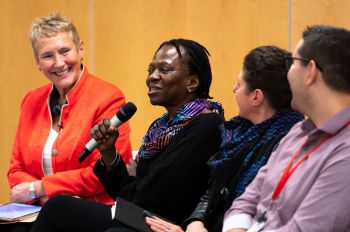Inclusive leadership is top of the agenda at ‘Inclusive Sussex: In Conversation with’ event
Posted on behalf of: Internal Communications
Last updated: Monday, 13 November 2023

Jane Farrell, Lela Kogbara, Dr Zahira Jaser and Dr Benjamin Everley
The University of Sussex welcomed Lela Kogbara and Jane Farrell, specialists in inclusive leadership, to our recent ‘Inclusive Sussex: In Conversation with’ event on 18 October.
Lela and Jane joined a panel featuring Professor David Ruebain, Pro-Vice-Chancellor (Culture, Equality and Inclusion) and senior lecturers from the University of Sussex Business School, Dr Benjamin Everley and Dr Zahira Jaser, who is also Director of the MBA Programme.
During the event, discussion focused on marginalised identities at work, gender and leadership and the positive and negative consequences of workplace equality, diversity and inclusion (EDI) programmes. The panellists also explored the extent to which EDI is compatible with profit-driven organisations.
David Ruebain said: "We were delighted to welcome Lela and Jane to campus to explore inclusive leadership with Zahira, Ben and me. Inclusive leadership is not only about understanding the breadth of diversity of individuals within a team and building relationships across identities but also about authenticity and practice.”
View images from the event and watch the replay below.
Revealing marginalised identities at work
The panellists explained the impact of concealing and revealing their identities at work during their career, sharing some of their own experiences and reflecting on the importance of context.
Speaking about the importance of role models, Ben said: “If you're in an organisation and you see people from a certain group and they're being their authentic selves, it obviously encourages people who are also part of that group that they can be open and authentic. We are constantly surveilling our environments and organisations to figure out whether we can be safe in those places. And so role models, and the policies that the organisations have in place, are really important.”
Conversation turned to the idea of stereotypes and the perception of what a leader is like. Zahira talked about the idea of the typical ‘leader prototype’ and how leaders who are different to this can succeed: “People emerge as leaders for several reasons – and we’ve heard incredible life stories here. There is massive hope that when people emerge as leaders, they can change the prototype. And I've seen a lot of change because we are seeing more leaders that are not the old-school prototype that we all imagine.”
The link between diverse leaders and a diverse workplace
Jane reflected on how having lived experience doesn’t necessarily help leaders tackle the issues faced by those with marginalised identities. She said: “There are some contexts in which lived experiences are valuable. However, it doesn't necessarily mean, as a woman, that I'm great at tackling institutionalised sexism, for example.” Lela added: “Lived experience is often bandied around but it can be a bit meaningless. And sometimes it can also be quite patronising, as people are put in a position where they are assumed to have no other skill other than their lived experience.”
The panel talked about how leaders can change cultures and organisations if they are willing to help dismantle how privilege plays out. However, there has also been a noticeable trend towards diverse leaders emerging in more conservative environments, with the UK government, financial organisations and consultancies being examples of this.
Jane said: “Companies want the best people they can get their hands on from across the globe. They're going think about diversity and inclusion because they see it as a tool and as an advantage. The leadership needs to be right because if Black people join and it’s a hostile environment they will leave, and that costs money.”
Do EDI programmes in organisations work?
As a thought experiment, David challenged the panel by asking whether organisations can be overly concerned with values and become ‘stuck’ on EDI initiatives.
Jane said: “It has to be right. It's a long-term project, and we have to be as strategic and creative and innovative about what will affect change, how we equip inclusive leaders to be able to affect change, and how we make sure that it's exciting.” Lela added: “When people start believing that it's because of their difference that they are going to be better leaders, not in spite of it, then you get somewhere.”
Following the event, Ben said: "I really enjoyed participating in the 'In Conversation' panel. I loved the format where we were able to explore the interplay between the panelists' lived experiences and relevant academic research findings. Professor Ruebain did a great job moderating the discussion and creating an environment where we could openly share our experiences and opinions."
About the event series
Our ‘Inclusive Sussex: In Conversation with...’ event series supports our Inclusive Sussex strategy by exploring issues of liberation, equality, diversity and justice with voices from all walks of life, bringing their expertise and lived experiences to the fore.
Sussex has a proud history of welcoming staff and students from the widest range of backgrounds and from all over the world, and in working to create a truly inclusive community that values diversity of identity, background, belief, thought, discipline and method. We continue to strive for Sussex to be a leading example of good practice in advancing equality, diversity and inclusion and a place which welcomes rigorous discussion and debate and where everyone can thrive.
Upcoming ‘Inclusive Sussex: In Conversation with...’ events will be available soon on the Staff Hub.
